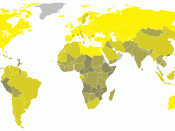This diet is has been labeled as a dietary intervention to increase life span. Calorie Restriction is a type of diet in which calorie ingestion is reduced, compared to diets that do not limit consumption. Calorie Restriction with Optimum Nutrition, also called the Longevity Diet, has the potential to increase the average and maximum life span. Calorie restriction is best characterized as under nutrition without malnutrition. Optimum Nutrition consists of eating the right amounts of nutrients on a proper schedule to achieve the top performance and the longest possible lifetime in excellent health.
Calorie Restriction will extend life. Calorie restriction has been proven to extend the average and greatest life span for many species including worms, mice, rats, etc. Animal experiments on calorie restriction after maturity indicate that adult-onset Calorie Restriction also lengthens longevity. Many mechanisms have been proposed to try to explain why this calorie restriction diet increases life span.
Studies at the molecular level have shown that many genes in the sirtuin class of the DNA, including SIRT1, SIRT3, and SIRT4, create enzymes that increase the activity of the mitochondria and slow the cell's aging process. There have not been sufficient studies to conclude if humans on calorie restricted diets will live longer, but introduction observations of the physiological changes caused by calorie restriction show that life-lengthening effects should also be evident in humans.
Calorie restriction is an approach, an everyday life choice when practiced by humans that has been proven to increase healthy and highest life span in rodents and primates. Certain animal studies that have been done over the past two decades have shown up to a 40% increase in optimum life span. Calorie restriction also provides many secondary health benefits, such as a greatly lowered danger for many degenerative conditions of the aging process. New research has shown these same secondary health benefits in humans too. Many of the researchers involved in these studies believe the current facts show that the practice of calorie restriction will extend the healthy human life span, however there has not been conclusive, hard evidence to show this.
With the diet of calorie restriction, nutritional selections are extremely imperative. Calorie-poor, nutrient-rich foods like veggies are selected over sugary, high carb, and high fat food items. It is vital for people who are on a calorie restriction diet to be well-informed on nutrition and have regular appointments with their health care professional. Typically, the average American consumes somewhere between 2,000 to 3,000 calories a day. However, a person on the calories restriction diet usually only consumes about 1,500 to 2,000 calories.
Longevity is hard to prove however, because there are many other factors besides nutrition that affect how long a persons' lifespan is. In humans, calorie restrictions has been shown to lower blood pressure, advance the function of heart, veins, and arteries, and is known to lower blood insulin levels. Once again however longevity has only really been shown in certain animals, such as lab rats in one experiment. The case is different in humans though; there has been no hard evidence that shows a person on the CR diet living longer. Yet, if this diet successfully lowers blood pressure, insulin levels, and overall cardiovascular health as it is supposed to, then one might assume that the person will live longer.
Works CitedAbout.com: Longevity.< http://longevity.about.com/od/lifelongnutrition/p/calorierestrict.htm>.
Calorie restriction with optimal nutrition.< http://www.optimal.org/peter/cron.htm>.
Scientific Psychic.< http://www.scientificpsychic.com/health/crondiet.html>.




